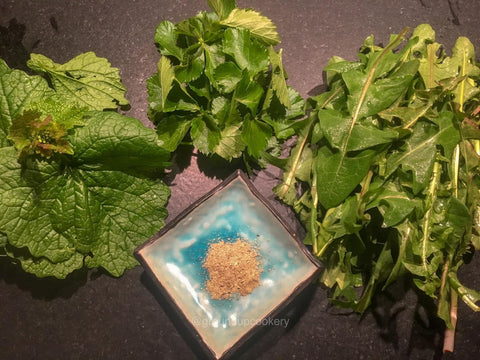Weed or Gem?
Dandelions (Taraxacum officinale) are truly abundant at this time of year. I don't know if its because I use them so much so I'm conditioned to look, but there seem to be more than usual this year. This is a powerhouse of a herb and is reported to contain vitamins A, C, E, K, B6, beta carotene, folate, thiamine, riboflavin, calcium, iron, potassium and manganese and has long been used in herbal medicine where it has been used to treat a range of ailments including respiratory problems to nervousness!

All parts of the dandelion plant are edible, the flower buds can be salted to make capers, the flowers make a vegan hunny which almost perfectly imitates the real thing. They can also be dipped in a gram (chick pea) flour batter and fried to make a crispy snack, (chef tip: leave the stalks on if you do this as it makes it easier to lift the flowers in and out of the oil as they cook). The fritters are delicious served with an Indian style riata or coriander and mint chutney.
The leaves of dandelions have a slightly bitter flavour, a little like chicory but not so pronounced, they are great in salads or wilted in a foraged greens stir fry. A particular favourite of ours is the combination of jack by the hedge (garlic mustard), alexander leaves and dandelion leaves quickly wilted with a dash of soy sauce and a sprinkle of cep powder as a seasoning. The leaves can be used in any application that you would use spinach for. You couldn’t ask for more, they’re free, delicious and package free. The perfect zero waste green!

The leaves pair well with other wild greens and sautéing a handful of dandelion leaves and nettle tops makes a great base for a pasta sauce, the mineral rich nettle flavour balancing beautifully with the delicate bitterness of the dandelion.
Of course we also lacto ferment the leaves to ensure we can access this fabulous green vegetable all through the year with the added benefit of the creation of all those good gut bacteria too!
The roots can be dried and make a passable caffeine free coffee substitute, again the bitterness associated with dandelion plays a key part here. Along with the dried leaves the roots are also used to make tea. We are currently experimenting with fermenting the roots and using that ferment to flavour alcohol, more on that in subsequent blogs!
Please be aware that dandelions are a really important early season nectar and pollen source for our pollinating insects, please forage responsibly and leave nature its share.
